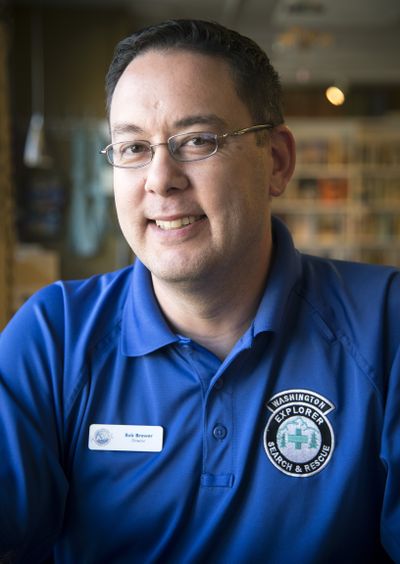Spokane volunteer always ready for search-and-rescue mission

The 3-year-old boy went missing on a cold, rainy November day in 1998.
He was last seen with the family dog, maybe. He was following the dog, or the dog was following him.
The boy went down to the river, or he might have walked the other way, into the hills.
But it was undeniably cold. And it was raining.
“We were getting pretty worried,” Rob Brewer said.
It’s these kinds of nebulous situations – where the unknown outnumbers the known – that Brewer trains for.
As a search-and-rescue volunteer Brewer is ready to “drop his fork at the dinner table” and start searching for someone who, as he says, is having the worst day of their lives.
“I find it a very rewarding way of giving back to the community,” Brewer said.
After searching for most of the afternoon, and into the night, Brewer said the searchers found the boy huddled under a tree. Still with the dog.
“That feeling of elation, hearing that this boy was found successfully, that was fantastic,” he said.
That was Brewer’s first live-person search and rescue. Since then he’s volunteered on many searches. They don’t always turn out well, but Brewer said the work is fulfilling and meaningful.
“Some people are obviously in it for the glamour and the glitter,” sheriff’s Deputy Thad Schultz said. “That’s not what Rob is about. His heart is in the right place. He wants to help somebody that is definitely in need.”
Brewer works as an information technology specialist for the Washington state Department of Transportation. In addition, he spends between 20 to 25 hours a month volunteering as an adviser for the Spokane County Explorer Search and Rescue, secretary for the State of Washington Search and Rescue Volunteer Advisory Council, and treasurer for the National Association for Search and Rescue.
Brewer’s main commitment is as adviser for the Explorer Search and Rescue. A youth organization, participants must be at least 14 years old and have to have graduated from eighth grade to participate. He said there are currently seven youth members and three adults. The young people learn land navigation skills, survival skills and basic first aid, Brewer said. They spend roughly 60 hours training every fall. Part of that training is learning the art of search and rescue.
And it is an art, of sorts. It requires a balance of level-headed thinking, quick reactions and mathematical considerations that are invisible to the untrained eye but influence every decision made on a search.
These considerations start when the call comes in, Brewer said. There are six different search-and-rescue teams in Spokane County, including the Explorers. Schultz is the coordinator for the county search-and-rescue teams. He decides who should respond and then dispatches that team. When the team arrives on scene they start gathering as much information as they can about the missing person.
This is an important step because the age and gender of the person greatly determines how far they may have wandered, Brewer said. There are statistical models that show the average distance people of different ages and genders are likely to move. That helps searchers focus their efforts.
Basically the goal is to find where the person was last and then circle outward, Brewer said.
Searches have taken Brewer deep into the mountains, the hay fields of Eastern Washington and Pig Out in the Park.
For instance, several years ago a group home took residents with dementia to Pig Out in the Park. One went missing – search and rescue was called.
“You have a description of a gentleman that is 5 feet, 10 inches tall and wearing blue jeans,” Brewer said.
In that situation they fanned out throughout the park calling the man’s name. They found him shortly after mobilizing, Brewer said.
It’s rare for a search to not return with someone, Brewer said. Occasionally it happens, but most often the searchers find the person, whether they’re alive or dead.
Getting called to a search knowing that the chances of finding someone alive are low is particularly hard, Brewer said.
“Someone started on that search hoping that they were going to have a really good outcome,” Brewer said.
Still, at the end of the day Brewer is motivated by the fact that he’s truly helping someone. Plus, being an active outdoorsman, he appreciates knowing there are men and women like him willing to go searching if he gets lost.
“We hope that we never run into the same situation ourselves, but we know that there are dedicated, well-trained volunteers out there that are willing to drop the fork at the dinner table and go on a moment’s notice,” Brewer said. “That’s why we’re in it.”